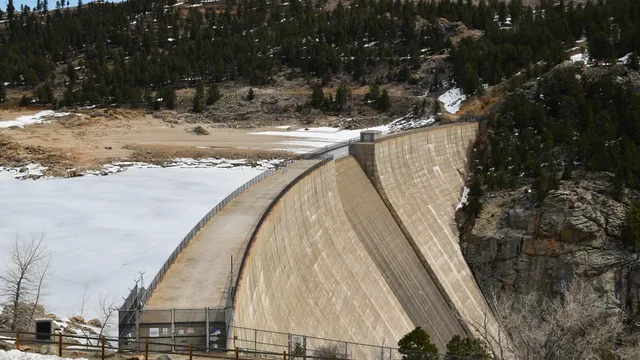
Judge halts crucial water supply project over environmental concerns
2025-04-05 13:18- A federal judge halted construction on the Gross Reservoir expansion project due to environmental concerns related to trees and wildlife.
- The ruling affects a half-billion-dollar project that was projected to significantly increase the reservoir's water capacity.
- Denver Water plans to appeal the decision, emphasizing the project's importance for the water supply of 1.5 million people.
Express your sentiment!
Insights
In the United States, a recent court ruling has significant implications for a major water supply project in Colorado. Denver Water was in the process of expanding the Gross Reservoir, aiming to raise the dam's height by 131 feet and nearly triple its capacity. However, a federal judge intervened, citing environmental harm as the reason for a halt in construction. This decision came after years of permitting and consideration of environmental efforts that included negotiations with multiple agencies and stakeholders. The construction was approximately 60% complete when the judge issued a preliminary injunction, which also vacated important decisions from the U.S. Army Corps of Engineers and detailed concerns regarding wildlife and the logging of 500,000 trees. Moreover, the ruling mandates a reassessment of the environmental impact, which includes potential water diversions and alterations to local ecosystems. Denver Water has expressed deep concern over the ruling, claiming it conflicts with essential public interests, especially as drought conditions prevail in the region. They contend that the project is critical for sustaining the water needs of 1.5 million residents in the Denver and Boulder areas. Environmental activists have rallied against the expansion, arguing it threatens vital wildlife habitats and increases environmental degradation. The legal battle, initiated by residents and several environmental groups, underscores the tension between infrastructure development and ecological preservation. Denver Water plans to appeal the judgment, aiming to resume work before its federally mandated completion deadline in 2027. Despite the halted expansion, discussions are expected to continue in the courts regarding how to address the dam's safety without further compromising environmental commitments. This scenario highlights the complexities of approving construction projects that require extensive permits and bring together various interest groups.
Contexts
The Gross Reservoir expansion project aims to increase the water storage capacity of the existing reservoir in order to meet the growing water demand in the surrounding areas and improve water reliability. This expansion is particularly crucial given the challenges posed by climate change, which has led to altered precipitation patterns and increased drought conditions in the region. Environmental impact assessments play a vital role in examining the potential consequences of such large-scale projects, focusing on key aspects including water quality, wildlife habitats, and local ecosystems. It is essential to understand how the expansion may affect both the immediate and surrounding environments to ensure sustainable development practices are employed. One major environmental concern associated with the expansion of Gross Reservoir is the potential impact on aquatic life. Modifications to water levels and flow rates can disrupt the habitat conditions necessary for local fish and other aquatic organisms. Additionally, the alteration of the reservoir's shorelines and the increase in recreational activities could further lead to habitat degradation. The project must therefore implement measures such as habitat restoration and fish passage enhancements to mitigate these impacts and promote the health of aquatic ecosystems. Another significant consideration is the effect of the expansion on terrestrial wildlife. The project area may serve as critical habitat for various species, some of which could be listed as threatened or endangered. As construction and associated activities may lead to habitat fragmentation, it is imperative to conduct thorough wildlife surveys and establish conservation strategies to minimize displacement and disturbance to these animals. Collaborative efforts with local wildlife agencies will also be necessary to monitor wildlife populations and identify further protective measures. The community's response to the Gross Reservoir expansion is equally important, as local residents may have concerns regarding changes in landscape, access to recreational opportunities, and potential increases in traffic and noise during construction. Engaging stakeholders early in the planning process, including holding public forums and providing transparent information, can foster trust and identify community-driven solutions. Balancing the need for increased water resources with the protection of environmental integrity and community interests will be critical for the successful implementation of the expansion project.